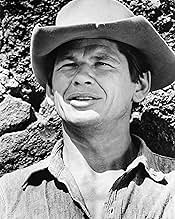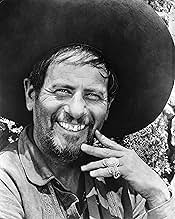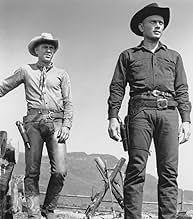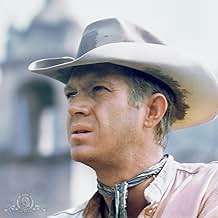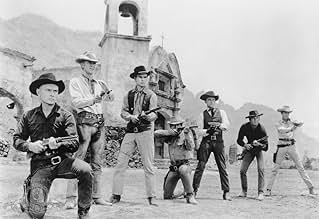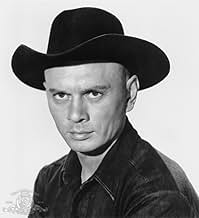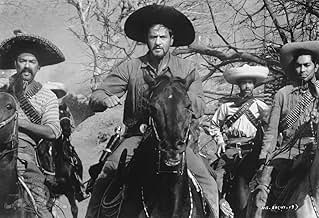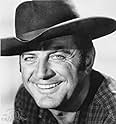Seven gunfighters are hired by Mexican peasants to liberate their village from oppressive bandits.Seven gunfighters are hired by Mexican peasants to liberate their village from oppressive bandits.Seven gunfighters are hired by Mexican peasants to liberate their village from oppressive bandits.
- Nominated for 1 Oscar
- 2 wins & 6 nominations total
Jorge Martínez de Hoyos
- Hilario
- (as Jorge Martinez de Hoyas)
Natividad Vacío
- Villager
- (as Natividad Vacio)
John A. Alonzo
- Miguel
- (as John Alonso)
Summary
Reviewers say 'The Magnificent Seven' is often compared to 'Seven Samurai', highlighting similarities in plot and themes. While praised for its strong cast, including Yul Brynner and Steve McQueen, and its iconic score, it is seen as less profound and more formulaic. The Western setting and Hollywood production style differentiate it from the more culturally specific and artistically driven original.
Featured reviews
This is considered one of the all-time great westerns: a real classic, and I can't argue. I've seen a number of faster-moving and better westerns but few with a cast this good that's still entertaining. I never get tired of seeing the stars in this movie. How often are actors like Yul Brynner, Steve McQueen, Charles Bronson, James Coburn and Eli Wallach boring.....or all in the same movie? Not too often. Throw in Robert Vaughn and Horst Buchholz and you have a memorable cast.
As "cool" as McQueen was in his day, in this film Brynner was the "coolest" guy. Just the intense look on his face with those piercing eyes and deep voice command attention whenever he's on screen. Meanwhile, nobody but nobody played a Mexican villain better than Wallach.
The "good guys" in this classic movie are all professional killers and show their human side by admitting their weaknesses and the emptiness of their profession. No one says it better here than Bronson, who gives a couple of very powerful "sermons" to some young boys.
A solid western and a pretty famous theme song, too! It's also another good example of showing some real tough guys who can be convincing without profanity. Can you imagine the dialog if this film was re-made today?!
As "cool" as McQueen was in his day, in this film Brynner was the "coolest" guy. Just the intense look on his face with those piercing eyes and deep voice command attention whenever he's on screen. Meanwhile, nobody but nobody played a Mexican villain better than Wallach.
The "good guys" in this classic movie are all professional killers and show their human side by admitting their weaknesses and the emptiness of their profession. No one says it better here than Bronson, who gives a couple of very powerful "sermons" to some young boys.
A solid western and a pretty famous theme song, too! It's also another good example of showing some real tough guys who can be convincing without profanity. Can you imagine the dialog if this film was re-made today?!
I've seen both the American and Japanese versions many times, and while everyone agrees about which one is better, the American version has some virtues: 1) Our heroes are selected by the farmers when they defend a dead Indian's right to be buried in the same place as white people; therefore they are seen as champions of social and racial equality by the farmers. 2) A magnificent villain played by Eli Wallach. 3) Charlie Bronson's relationship with the village boys. And some tremendous faults: 1) Combining the Young Student and Crazy Fool characters; some of the most poignant scenes in the Japanese version involved the interaction between these two. 2) Not filming the final battle in the rain. And of course many more of each. It's an interesting discussion. Both are great movies that shouldn't be missed. Remember that Kurosawa gave John Sturges a sword in appreciation after seeing his film.
Every year a Mexican bandit and his large gang of forty thieves harass and plunder a poor farming village south of the American border. They take what they need in provisions from the increasingly impoverished inhabitants. Deciding that enough means ENOUGH (and the wise old man in the village advises that it is DO or DIE), the village elders recruit gunmen from the US to defend them. The actual recruiting of six of the motley crew of gunslingers is done by top American gunman, the grim Chris Adams (Yul Brynner), dressed in black. The wages are only twenty dollars but chow is included, and it is good Mexican food (as the Americans discover). Each one of the defenders has his own reasons for volunteering, and not necessarily as a sense of doing the right thing (one of the men is a soldier of fortune). The men have various talents. For instance, one is a sharpshooter; another is handy with a knife. Much of the film is obviously a build-up to the final confrontation between the "good guys" and the banditos.
Outside of the rousing action-packed sequences, this movie has four merits: the actors, the cinematography, Elmer Bernstein's Oscar-nominated music score, and the on-location filming in Mexico. Stars and future stars like Yul Brynner, Charles Bronson, Steve Mc Queen, Robert Vaughn, and James Coburn do not disappoint. Eli Wallach, the future "Tuco," stars as an appropriate pitiless Mexican leader Calvera, who is not without his own concerns. Of course, with so many personalities, actors "battle" for screen time. There is an underlying message in this movie (and in subsequent remakes) that is overlooked: Mexico was a place of anarchy where the federal government could not always keep law and order.
John Sturges' western was lifted from Akira Kurosawa's "Seven Samurai" (1954), perhaps the greatest movie ever filmed in Japan. In this original version, seven unemployed samurai swordsmen are also hired to fight bandits who terrorize a village. But Kurosawa made a superior film showing the importance of the code of honor of the defenders along with their three-dimensional character development (the film's length was much longer). He even showed a sketch of the Japanese village and the name (or symbols) of each of the bad guys. So when one of them was bumped off, one of the samurai would cross off his name from the bandit list. This helps the audience understand the defensive strategy and what was happening in the battles as the number of the bandits diminished.
Nevertheless, "The Magnificent Seven" does stand on its own merits in the heyday of American westerns as a very good movie to enjoy. Even though the pacing is slow, it remains worthwhile watching.
Outside of the rousing action-packed sequences, this movie has four merits: the actors, the cinematography, Elmer Bernstein's Oscar-nominated music score, and the on-location filming in Mexico. Stars and future stars like Yul Brynner, Charles Bronson, Steve Mc Queen, Robert Vaughn, and James Coburn do not disappoint. Eli Wallach, the future "Tuco," stars as an appropriate pitiless Mexican leader Calvera, who is not without his own concerns. Of course, with so many personalities, actors "battle" for screen time. There is an underlying message in this movie (and in subsequent remakes) that is overlooked: Mexico was a place of anarchy where the federal government could not always keep law and order.
John Sturges' western was lifted from Akira Kurosawa's "Seven Samurai" (1954), perhaps the greatest movie ever filmed in Japan. In this original version, seven unemployed samurai swordsmen are also hired to fight bandits who terrorize a village. But Kurosawa made a superior film showing the importance of the code of honor of the defenders along with their three-dimensional character development (the film's length was much longer). He even showed a sketch of the Japanese village and the name (or symbols) of each of the bad guys. So when one of them was bumped off, one of the samurai would cross off his name from the bandit list. This helps the audience understand the defensive strategy and what was happening in the battles as the number of the bandits diminished.
Nevertheless, "The Magnificent Seven" does stand on its own merits in the heyday of American westerns as a very good movie to enjoy. Even though the pacing is slow, it remains worthwhile watching.
Re-make are seldom as good as the original, but here Hollywood or rather John Sturges managed to capture some of the spirit of Kurosawa's 'Seven Samurai' which itself owes something to the 'Three Musketeers' and which Sturges duly acknowledged in the credits. Partly this is due to some inspired casting. With the exception of Yul Brynner, none of the actors was particularly well known at the time. Steve McQueen, Charles Bronson, James Coburn, Robert Vaughn, Eli Wallach and Horst Buchholz (an unlikely Mexican) all went on to successful acting careers. The format of this film was replicated in many later films.
The plot couldn't be simpler. Desperate Mexican villagers, bled white by local bandits, retain a group of almost equally desperate gunslingers from the other side of the Rio Grand to deal with the bandits. A lot of the fun arises early on as leader Cajun Chris seeks out half a dozen suitably deranged but deadly types for the job. Ostensibly they are doing it for the money but it becomes apparent early on that they are really on the team just for the hell of it. Once they are together things don't quite go to plan, but the camaraderie holds up, and their mission is accomplished, though at considerable cost.
Despite all the action it is a character-driven piece in some ways. Eli Wallach's Calvera the bandit leader is more than a cardboard cut-out villain and Yul Brynner's enigmatic Chris keeps us guessing. The villagers, despite their matching white smocks, are not all lily-white and each of the Seven has at least one interesting weakness.
A strong feature of the film is the music, penned by the ubiquitous Elmer Bernstein, and entirely appropriate, with a main theme which seems to be permanently welded into my brain.
'The Magnificent Seven' was made at a time when the appetite for westerns was going into decline. Whereas westerns were staple film and TV fare in the 50's, the sixties saw a sharp decline, as spy dramas and sex farces burgeoned. One interesting theory I've heard about this is that it's not so much that the audience tired of westerns, but that TV executives discovered that they were being watched by the people too poor to buy their sponsor's fine products. Anyway this film holds up very well after 45 years, a true classic and satisfying to watch.
The plot couldn't be simpler. Desperate Mexican villagers, bled white by local bandits, retain a group of almost equally desperate gunslingers from the other side of the Rio Grand to deal with the bandits. A lot of the fun arises early on as leader Cajun Chris seeks out half a dozen suitably deranged but deadly types for the job. Ostensibly they are doing it for the money but it becomes apparent early on that they are really on the team just for the hell of it. Once they are together things don't quite go to plan, but the camaraderie holds up, and their mission is accomplished, though at considerable cost.
Despite all the action it is a character-driven piece in some ways. Eli Wallach's Calvera the bandit leader is more than a cardboard cut-out villain and Yul Brynner's enigmatic Chris keeps us guessing. The villagers, despite their matching white smocks, are not all lily-white and each of the Seven has at least one interesting weakness.
A strong feature of the film is the music, penned by the ubiquitous Elmer Bernstein, and entirely appropriate, with a main theme which seems to be permanently welded into my brain.
'The Magnificent Seven' was made at a time when the appetite for westerns was going into decline. Whereas westerns were staple film and TV fare in the 50's, the sixties saw a sharp decline, as spy dramas and sex farces burgeoned. One interesting theory I've heard about this is that it's not so much that the audience tired of westerns, but that TV executives discovered that they were being watched by the people too poor to buy their sponsor's fine products. Anyway this film holds up very well after 45 years, a true classic and satisfying to watch.
I saw this film umpteenth number of times in the late 80s n early 90s on a VHS. Revisited it recently on a DVD after watching the remake (Denzel Washington one). Well this movie itself is a western remake of Kurosawa's Seven Samurai. As a fan of western films n being a big fan of Mcqueen, i enjoyed it more than Seven Samurai. The film is an engaging n adventurous western, awesomely directed by John Sturges. The story is simple, poor farmers hire seven gunslingers to protect them from a small army of bandits.
Yul Brynner is full of attitude n terrific as the leader of the seven. Steve McQueen really shines as the right-hand man. Charlie Bronson in his leanest physique wearing a stylish full sleeves tshirt n denim shirt. James Coburn is cool but very deadly with his knife than guns. His body language speaking louder than any of his lines. Robert Vaughn as the man who loves to live life king size n who's fightin his inner demons. Brad Dexter is the big muscular guy with a good sense of humour. And then there is Eli Wallach as the bandit leader. Watch out for Wallach's statement on generosity. The film has a lot of great scenes involving the action and shootouts that is engaging to watch. The Magnificent Seven is not complete without mentioning Elmer Bernstein's legendary score.
Yul Brynner is full of attitude n terrific as the leader of the seven. Steve McQueen really shines as the right-hand man. Charlie Bronson in his leanest physique wearing a stylish full sleeves tshirt n denim shirt. James Coburn is cool but very deadly with his knife than guns. His body language speaking louder than any of his lines. Robert Vaughn as the man who loves to live life king size n who's fightin his inner demons. Brad Dexter is the big muscular guy with a good sense of humour. And then there is Eli Wallach as the bandit leader. Watch out for Wallach's statement on generosity. The film has a lot of great scenes involving the action and shootouts that is engaging to watch. The Magnificent Seven is not complete without mentioning Elmer Bernstein's legendary score.
Did you know
- TriviaAlthough the film received mixed reviews, Akira Kurosawa was so impressed he sent John Sturges a ceremonial sword as a gift.
- GoofsSteve McQueen wears Levi's jeans with the famous red tab, which were not introduced until the 1930s.
- Quotes
[Calvera has just captured the Seven]
Calvera: What I don't understand is why a man like you took the job in the first place, hmm? Why, huh?
Chris: I wonder myself.
Calvera: No, come on, come on, tell me why.
Vin: It's like a fellow I once knew in El Paso. One day, he just took all his clothes off and jumped in a mess of cactus. I asked him that same question, "Why?"
Calvera: And?
Vin: He said, "It seemed to be a good idea at the time."
- Crazy creditsAnd Introducing Horst Buchholz
- Alternate versionsThe German theatrical release differs from the German VHS video in the scene where the magnificent seven have been taken by surprise and have to put down their weapons on the table. Chico is the last one and stands in enragement. In the theatrical version he then nevertheless unstraps his belt like the others. In the VHS video version Chris jumps at Chico just in that moment when he wants to pull the gun. Chris takes his gun and puts it on desk. Then Chico unstraps his belt.
- ConnectionsFeatured in Precious Images (1986)
- SoundtracksThe Magnificent Seven Theme
Written by Elmer Bernstein
Everything New on Prime Video in June
Everything New on Prime Video in June
Your guide to all the new movies and shows streaming on Prime Video in the US this month.
- How long is The Magnificent Seven?Powered by Alexa
Details
- Release date
- Country of origin
- Languages
- Also known as
- Les sept mercenaires
- Filming locations
- Cuernavaca, Morelos, Mexico(desert, sets)
- Production companies
- See more company credits at IMDbPro
Box office
- Budget
- $2,000,000 (estimated)
- Gross worldwide
- $416
- Runtime2 hours 8 minutes
- Color
- Sound mix
- Aspect ratio
- 2.35 : 1
Contribute to this page
Suggest an edit or add missing content



